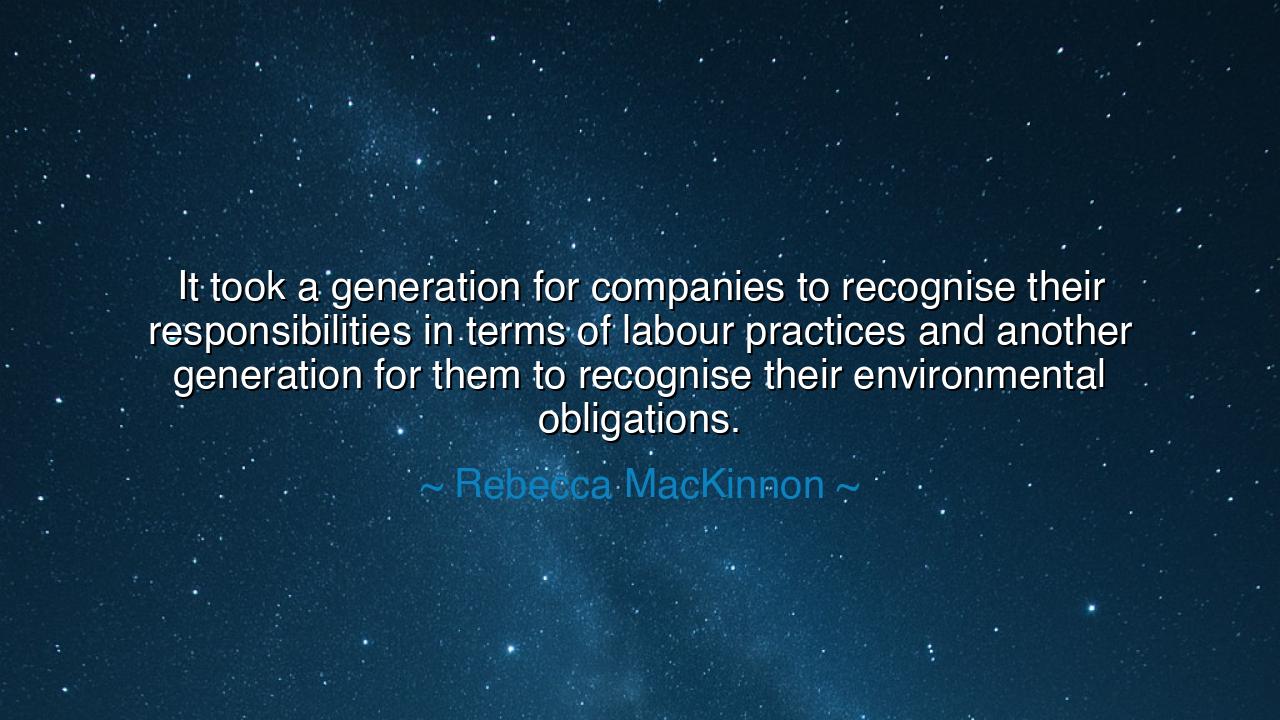
It took a generation for companies to recognise their
It took a generation for companies to recognise their responsibilities in terms of labour practices and another generation for them to recognise their environmental obligations.






Hear, O listeners, the words of Rebecca MacKinnon, who declared: “It took a generation for companies to recognise their responsibilities in terms of labour practices and another generation for them to recognise their environmental obligations.” Within this utterance lies the story of human struggle against the slow, grinding pace of progress. She speaks of the awakening of conscience in the world of commerce, where profit long stood above justice, and where recognition of duty toward both workers and the earth came only after decades of sacrifice, suffering, and relentless demand for change.
The meaning of her words is this: the powerful rarely relinquish their dominance quickly. For a generation, workers toiled in misery, bound by unsafe conditions, starvation wages, and child labor, before companies bowed to the rising thunder of the labor movement. Strikes, protests, and even bloodshed carved into history the truth that human beings are not machines. Yet even as these victories were won, it took another generation for companies to turn their eyes outward, to see that their duty extended beyond the factory floor to the rivers, forests, and skies that sustained all life. The awakening of responsibility came not in a single stroke, but in the long march of time.
The ancients, too, warned of this slowness of human conscience. The philosopher Plato wrote that justice must be cultivated in the soul, for without cultivation it withers. In the same way, corporate power, left unchecked, tended only toward its own gain, deaf to the cries of laborers and blind to the wounds inflicted upon the earth. Only when voices rose in unison—workers demanding rights, citizens demanding clean air—did conscience force its way into the councils of profit.
History gives us vivid examples. In the early 20th century, the Triangle Shirtwaist Factory fire in New York City claimed the lives of over one hundred young immigrant women, locked inside their workplace. The tragedy sparked outrage and drove reform, becoming a turning point in the struggle for safe labour practices. And later, in the latter half of the century, rivers in America literally caught fire from industrial waste, such as the Cuyahoga River in Ohio, poisoned until it could no longer flow clean. These calamities remind us that both labor justice and environmental protection were born not out of generosity, but out of necessity, carved from catastrophe.
Yet MacKinnon’s words are not merely lament. They are also a measure of hope—that humanity, though slow to awaken, does awaken. That what once seemed impossible—the banning of child labor, the recognition of unions, the establishment of environmental regulations—was achieved through generations who refused to surrender. Each generation carries the work forward: one wrests dignity from exploitation, another defends the earth from destruction. Progress may be delayed, but it is not defeated when courage persists.
The lesson for us is plain: do not grow weary in the face of delay. Change is slow because power resists it, yet change comes when persistence outlasts resistance. We must recognize that our own generation has its duty—not only to preserve the gains of the past but to push further. For if one generation fought for labor and another for the earth, then ours must fight for balance between technology, humanity, and nature, ensuring that the future is not consumed by the excesses of the present.
Therefore, O listener, let MacKinnon’s wisdom burn in your heart. Support companies that honor both workers and the earth; resist those that exploit either. Teach your children that progress is not gifted but earned, and that every generation must answer its call. Do not wait for catastrophe to force change—act now, with foresight and courage, so that those who come after us will not inherit a poisoned inheritance.
So let her words endure as both warning and charge: it took generations for justice to reach the worker and the earth—let it not take another for us to honor both together. For in unity of purpose, and in steadfastness of will, lies the power to bind commerce to conscience, and profit to the preservation of life itself.






AAdministratorAdministrator
Welcome, honored guests. Please leave a comment, we will respond soon